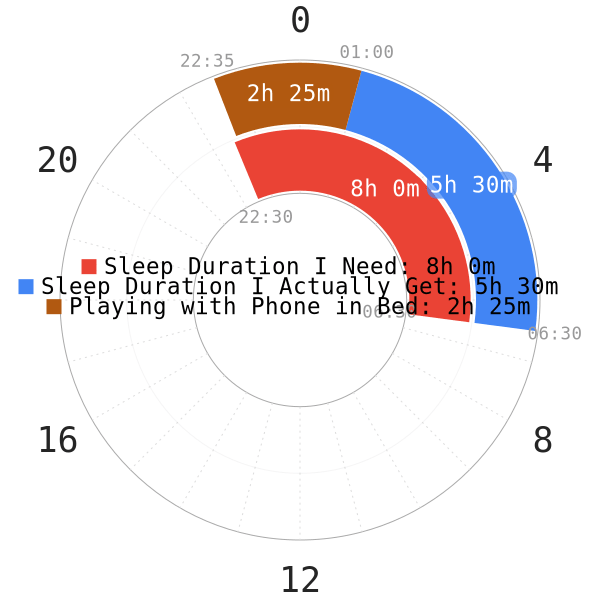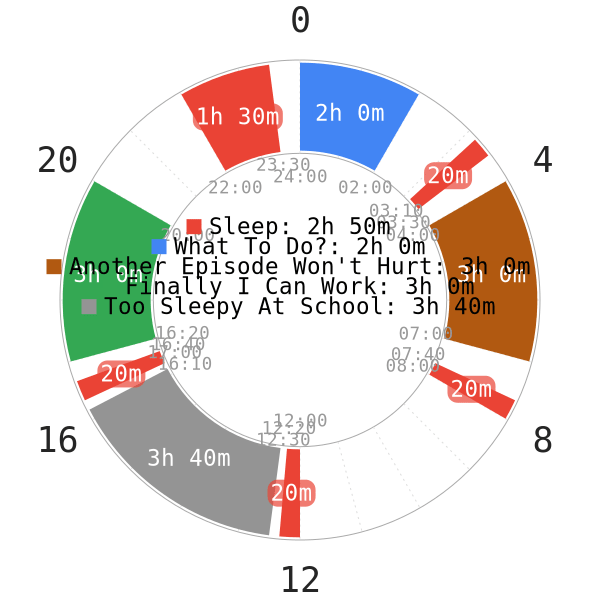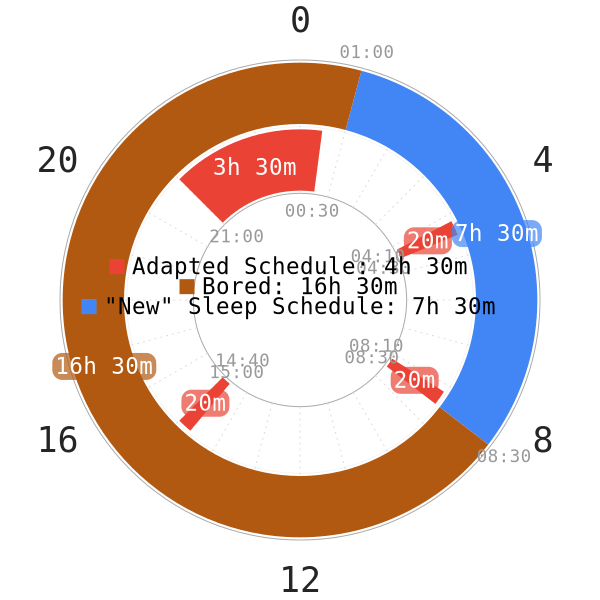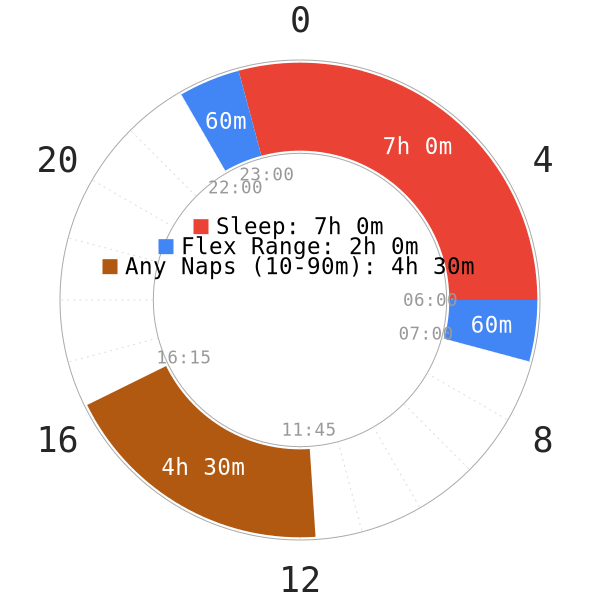Introduction
Procrastination is probably one of the most old-schooled topics ever. It is actually so common that it is likely normal to procrastinate. First and foremost, procrastination is the inclination to delay starting or completing work activities, a very deleterious form of self-regulatory failure1. In addition, the self-regulation process in humans is also tied to self-control, discipline and willpower. All these parameters, overall, directly influence decision making, including procrastinating.
In reality, there are apparently moments when procrastination is necessary. For example, sometimes it is not the appropriate time to buy or make a big purchase. Because of the vast array of studies and information on this topic, we will only focus on how “bad” procrastination affects sleep quality. Ultimately, we will attempt to showcase how polyphasic sleeping as a lifestyle fares against procrastination.
Procrastination & Sleep Quality
How Sleep Quality Causes Procrastination
Although it may appear that procrastination has nothing to do with sleep, research suggests otherwise. In fact, multiple research outlets have agreed on how procrastinating things can actually worsen sleep quality.
- Because human willpower resource is only finite, abusing it can only go so far. Specifically, high stress work days and low willpower result in self-regulatory failure and bedtime procrastination2. However, less stressful days tend to yield opposite effects.
- In terms of chronotype, evening types tend to procrastinate more than morning types. This is because of their habitually late bedtime, which clashes with morning work hours1,3-5.
- Poorer sleep quality (e.g, interrupted sleep, insomnia) is a breeding ground for procrastination at work4,5. Nevertheless, workers with high self-control are immune to procrastination4.
- Shift workers, who have a misaligned circadian rhythm, also procrastinate more at work5. Upon getting more sleep, though, they can hold themselves well against procrastination.
How Procrastination Wrecks Sleep

On another spectrum, procrastination habits also lead to poorer sleep quality, but most notably with low self-control and discipline. Below are some effects:
- Insomnia3 (including interrupted sleep and trouble falling asleep).
- Shortened sleep duration, which results in cumulative sleep deprivation on shortened monophasic sleep.
- Comprehensive studies, including one on a Chinese student population, show that bedtime procrastination and shorter sleep are results of cellphone addiction before bedtime6.
- Boredom in the form of excessive available time also predicted inattention and bedtime procrastination7. Therefore, we will focus on this point in later sections because of how important it is for polyphasic sleepers.
- Excessive daytime sleepiness8. If left unchecked, it can lead to random napping and drastically affect the subsequent nocturnal sleep session. This is, however, a byproduct of shortened monophasic sleep.
- Circadian misalignment5,8.
- It is only clear that delaying bedtime will only shift the circadian rhythm to later hours in the night. With this shift, it is similar to having a third shift work schedule.
- The changes in sleep timing between weekends and weekdays cause social jetlag; sleep begins at much later hours at night on weekdays and ends at later hours in the morning on weekends, for example.
However, it is worth noting that depending on human population and other individual factors, the causes and effects of procrastination and sleep quality may not be as concrete8.
The Blind Spots of Polyphasic Sleep
Wow! Look at that schedule! That’s 22 hours awake each day that legends like Leonardo Da Vinci got. That is definitely the super key to dealing with procrastination, right? There is so much stuff to do, that I sometimes even wish I did not need to sleep at all!
Well, except that the question is how long can you last with that much wake time. And, are you actually sure you need THAT much time to be able to do all daily activities or prepare for an exam? Here we discuss the blind spots that new polyphasic sleepers often overlook when they demand a ridiculous amount of extra wake time each day.
More Wake Time & More Brutal Adaptation Phase
Polyphasic beginners are prone to be allured by a lot of extra wake time on many schedules. Nonetheless, the adaptation period is going to hurt a lot. We have indeed seen countless incomplete adaptations to extreme polyphasic schedules or even “less difficult” schedules like E3.

- Intensified sleep deprivation during adaptation will extinguish a lot of would-be productive hours when awake. Many adapted sleepers have to cycle back and forth with very menial tasks just to stay awake, let alone handling complex activities.
- We also learn that butchered sleep quality or duration can induce more procrastination because of fatigue. As a result, cumulative sleep deficits from several days adapting breed irresistible procrastination habits.
- The brain does not function optimally during the harshest adaptation stages.
- Virtually any sleep reduction amounts can result in at least some tough days. This means that reducing polyphasic schedules, including the Biphasic group, can make you procrastinate more than usual with sleep cut.
- More wake time also means more hours to defend.
- When there is too much time, it can become overwhelming to fill in your day after you have completed every necessary task.
- If you are bored, you may also sit down on your couch a bit. And the next thing you know, you close your eyes and snooze!
Combining all factors, the actual amount of extra productive wake hours from an ongoing adaptation may not be as much as you think.
Reversion to Monophasic Sleep After Adaptation
So, it seems you have got through a grueling adaptation phase. It seems like things are back to normal now. You can actually do the work you have been yearning for so so long, with maximum enjoyment. Polyphasic sleeping has ultimately taught you to master napping and manage your time much better. So procrastination is no more, right? Right?!
Actually, it is still there. In fact, it always is. The truth of the matter is, we humans can procrastinate anything at any time, regardless of how inadvertent it is. There is a very convincing reason why many polyphasic sleepers have reverted to monophasic sleep. This happens even after they have grinded through the hard work and adapt to their schedule for some time.

- Adapted polyphasic sleepers CAN actually get bored with their own schedules. At some point in time, they run out of things to do, and cannot keep up with too much available time.
- Previously, we also learn that boredom can to some extent facilitate inattention and procrastination. This is probably a slow process to skipping nap times on purpose and destabilize the whole polyphasic schedule.
- The lack of time pressure and motivation to sustain lifestyle can tear their schedules apart. Sometimes, it is better to just sleep through the whole night and be done with it.
- In the community, quite a few members have adapted to polyphasic sleep but returned to the formerly poor sleep schedules. Therefore, procrastination can create vicious loops that negate all the hard-work adaptations.
In sum, procrastination may seem the silliest reason to give up a sound polyphasic schedule. However, there is nothing wrong with returning to monophasic sleep. It is merely part of the equation where procrastination is a button that resets everything.
Solutions for Polyphasic Sleepers
Non-reducing Polyphasic Schedules
The benefit of “extra wake time” is only a shiny facade of polyphasic sleep. Over the years, we have discovered other benefits of polyphasic sleep. And especially, this proposed solution may just be the best compromise of all worlds for those who love naps.

- Depending on your personal goals, sometimes not reducing sleep is a better idea.
- This is because when you do not need the extra time, you may as well spend those hours sleeping instead.
- Keeping a consistent sleep schedule and getting enough sleep per day is a good way to go. This does not matter if you sleep in 2 or 3 sleep segments per day without reducing total sleep. For instance, if you are a naturally segmented sleeper, you can still add a daytime nap.
- Since your day is normal with the similar amount of waking hours as on your monophasic schedule, you probably do not need to change your habits much.
- You are less likely to procrastinate if you have fewer waking hours to do so. You may also feel that your day passes by faster since you sleep a “normal” amount at night while having a daytime nap or so.
- Polyphasic sleep offers you many tools and tips to improve your own sleep schedule. With improved and structured sleep quality, you will perform well in the day with a lot of energy. In other words, you do not have to fear sleep deprivation symptoms as much as on reducing schedules.
- Non-reducing schedules “force” you to become more efficient with your current waking hours. As a result, you may actually have to “adapt” to more time management tricks to aid with your limited time budget.
Estimating & Calculating Your Wake Hours
Other than “not reducing” sleep time, which may be a complete turnoff for newcomers, there are still certain things you can do.
- If you can estimate that you only need ~18h per day to pursue all your hobbies, then your sleep schedule should have ~6h total sleep.
- This means that Biphasic schedules, Triphasic-extended and Dual Core 1-extended will suit your goals.
- You also will not waste much time at all out of your schedule’s total sleep.
- On the other hand, if you only require 16h per day to finish your course work and time for some hobbies, non-reducing schedules are your best friends.
- You get the opportunity to learn to nap without having to go through the intense Naptation.
- Once you find out your timetable allows for more sleep cut, and you actually need more time, transition to a reducing schedule. This is when you know that procrastination will not hamper your adaptation or productivity much. The extra wake time is really what you are after!
- Non-reducing schedules with frequent sleep can actually boost your productivity with a daytime nap! This means more energy to carry you through the rest of the day without having to battle to stay awake if you have a bad monophasic night.
Other Intervention Methods for Procrastination
Procrastination can actually get so out of hand that medical interventions are necessary. This is usually the case if you are aware of your problems but cannot fix them no matter what. It would then probably be a good idea to ask for professional help.
- Psychological interventions, such as cognitive behavior therapy, can improve self-control9,10.
- Other methods include focusing on individual strength and weakness resources and self-regulation10.
- According to a meta-analysis, cognitive behavior therapy yields the strongest effects on reducing procrastination10.
- Experimental interventions that work on time management skills can also shape new routines11. This includes some methods:
- Discussing with others about personal problems and weaknesses.
- Filling out diaries on personal goals and work progress.
- Exploring most suitable time management options for procrastinators.
All in all, all interventions have flaws and considerable interindividual variances. However, they may be the first necessary steps to take before endorsing polyphasic sleeping. While it is true that a few people vastly enhance their productivity on a polyphasic schedule, this is likely not the case for strong procrastinators. Polyphasic sleeping in itself should not be the ultimate or only tool to rely on to “cure” procrastinating habits.
To pursue the polyphasic lifestyle long-term, self-control and motivation are going to be the strongest solutions for procrastination.
Conclusion
In conclusion, procrastination has been and is always a very pesky personal problem. Our community has recorded many cases who struggle with motivation and productivity even on a polyphasic schedule. Even though polyphasic sleeping does offer some solutions, it is not a surefire way to go if you want to completely overhaul your procrastinative lifestyle.
There are many things at stake and our best recommendation would be to change your approach to your important goals one by one. Then, attempt a polyphasic schedule, knowing what you are heading into and preparing for.
Main author: GeneralNguyen
Page last updated: 5 March 2021
Reference
- Kühnel, J., Bledow, R., & Feuerhahn, N. (2016). When do you procrastinate? Sleep quality and social sleep lag jointly predict self-regulatory failure at work. Journal of Organizational Behavior, 37(7), 983–1002. doi:10.1002/job.2084.
- Bernecker, K., & Job, V. (2019). Too exhausted to go to bed: Implicit theories about willpower and stress predict bedtime procrastination. British Journal of Psychology. doi:10.1111/bjop.12382. [PubMed]
- Hairston, I. S., & Shpitalni, R. (2016). Procrastination is linked with insomnia symptoms: The moderating role of morningness-eveningness. Personality and Individual Differences, 101, 50–56. doi:10.1016/j.paid.2016.05.031.
- Van Eerde, W., & Venus, M. (2018). A Daily Diary Study on Sleep Quality and Procrastination at Work: The Moderating Role of Trait Self-Control. Frontiers in Psychology, 9. doi:10.3389/fpsyg.2018.02029. [PubMed]
- Kühnel, J., Sonnentag, S., Bledow, R., & Melchers, K. G. (2017). The relevance of sleep and circadian misalignment for procrastination among shift workers. Journal of Occupational and Organizational Psychology, 91(1), 110–133. doi:10.1111/joop.12191.
- Zhang, M. X., & Wu, A. M. S. (2020). Effects of smartphone addiction on sleep quality among Chinese university students: The mediating role of self-regulation and bedtime procrastination. Addictive Behaviors, 106552. doi:10.1016/j.addbeh.2020.106552.
- Teoh, Ai Ni, Evangel Yi En Ooi, and Alyssa Yenyi Chan. “Boredom affects sleep quality: The serial mediation effect of inattention and bedtime procrastination.” Personality and Individual Differences 171 (2021): 110460.
- Li, Xiaoyu, et al. “Do procrastinators get worse sleep? Cross-sectional study of US adolescents and young adults.” SSM-population health 10 (2020): 100518.
- Rozental, A., Bennett, S., Forsström, D., Ebert, D. D., Shafran, R., Andersson, G., & Carlbring, P. (2018). Targeting Procrastination Using Psychological Treatments: A Systematic Review and Meta-Analysis. Frontiers in Psychology, 9. doi:10.3389/fpsyg.2018.01588. [PubMed]
- Van Eerde, W., & Klingsieck, K. B. (2018). Overcoming Procrastination? A Meta-Analysis of Intervention Studies. Educational Research Review. doi:10.1016/j.edurev.2018.09.002.
- Häfner, A., Oberst, V., & Stock, A. (2014). Avoiding procrastination through time management: an experimental intervention study. Educational Studies, 40(3), 352–360. doi:10.1080/03055698.2014.899487.
